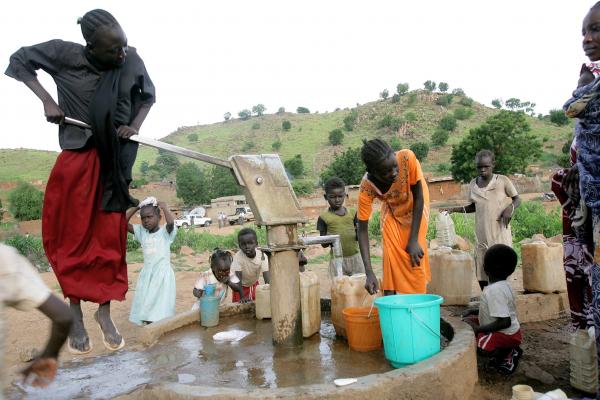On Monday, three West Virginia bishops joined by families and advocates pressed the state's politicians to protect poor and working families — or, in other words, the “least of these” — during budget battles in Washington.
The budget and tax negotiations are complex and important. They're driven in large part by the expiring Bush tax cuts and steep across-the-board spending cuts set to kick in if Congress does not act.
Congressional Republicans have been demanding deep spending cuts in programs, including Medicaid and Social Security. They've also defended tax cuts for the wealthy. A number of religious figures say those priorities are backwards.
Felicia Thomas, 24, director at Fort Hill Child Development Center, spoke at the meeting. Thomas is a single mother of a five year old little girl. Federal programs like Earned Income Tax Credit and child care subsidies have allowed Thomas not only to pursue her dreams of a better future, but also to keep the lights on and the fridge stocked.
As I write, I'm stuck in the Central Wisconsin Airport (near the bustling metropolis of Wausau, Wis., for those keeping score at home). And, you guessed it, I'm waiting. Fog in Minneapolis prevented our plane from landing there, and now I'm left sitting in a very small regional airport with no restaurant and no coffee and no concrete sense of what the rest of my day will look like as I make my way to California. All I can do is wait.
I do know, barring something entirely unexpected, that I'll eventually make it to San Francisco. Right now I'm living the axiom offered by Tom Petty decades ago: "The Waiting is the Hardest Part."
Advent, a season during which Christians honor and attempt to approximate the longing for a Messiah more than 2,000 years ago, is often described as a chance to exercise our patience muscles. Advent can serve as a season of anticipation and hope and longing, void of desperation. This is Advent for those who already have most of that for which they wait. But for countless people around the globe, every additional day of waiting comes with a heavy price.
Editor's Note: The following is a statement by Jim Wallis given at the kickoff of the National Strategy Session — a gathering faith, law enforcement, and business leaders who are reaching consensus on common-sense immigration reform. Throughout the week, the group is calling on Congress to create a road to citizenship for immigrants contributing to our society. You can follow a live stream of the press conference and strategy sessions HERE.
It’s quite an accomplishment to get Bibles, Badges and Business together all in one room and agreeing on something this big. This reminds us all that Christmas and the holiday season really is a time for miracles. It’s enough to make you believe there is a God! The country is hungry to see our political leaders work together and find a bipartisan solution to an issue of this magnitude. I have faith that comprehensive immigration reform is that common ground. And if we do this, who knows what else it might lead to.
One of the great debates around Christmastime for Christians is whether to encourage or allow the belief in Santa Claus. I have friends and family on both sides of this debate, so I want to be careful here. I have a great deal of respect for the desire to keep the focus on Jesus and his birth at this time of year. I want to encourage that focus, too.
And, yet, I allow my children … I encourage them even … to believe in Santa.
We — my husband and I — don’t just stop there. We also have elves that visit our house every year during this season. Some would say that at best I am distracting from the message of Christ. At worst I am lying to my children.
The line between fantasy and falsehood is delightfully fuzzy during childhood. God created it to be this way and it is so important for a child to be able to play in this grey area.
Most Americans say that employers — even religious ones — should provide birth control coverage to their employees, according to a survey released on Monday.
The poll by LifeWay Research also showed that almost two-thirds of Americans (63 percent) believe businesses should be required to provide the coverage for free, even if contraception conflicts with the owner’s religious ethics.
As part of the Affordable Care Act, the 2010 health care reform law, President Barack Obama issued regulations that require most employers, including some religious ones like Catholic colleges and hospitals, to provide birth control coverage. The administration has said it may expand the policy to accommodate additional religious organizations.
More than 600 representatives from the United We Dream network, the largest young adult immigrant movement in the country, have signed on to a new platform calling for an “inclusive pathway to citizenship” that includes DREAMers, their parents, and their communities. The group is pledging to hold both parties accountable and pressure them to create a roadmap toward citizenship for the 11 million undocumented immigrants in the country.
On my desk, next to my laptop, is a can of seltzer water. My grapefruit-flavored, bubbly water sits about four inches away from my left hand as I write. When the can is empty, I might take another from the fridge or fill up a water bottle at the kitchen sink.
Water drives my day, but I rarely think about it. I cook pasta in it. I heat water to make tea. I fill a bucket to mop the floor and a draw a bath with hot water and soak in it. At the moment, my dishwasher is growling away, and I’m waiting to hear the pleasant beep that alerts me that the clothes in the washer downstairs are clean.
I’ve never considered water a women’s issue. Not until this past week, that is. On Friday, the day before World AIDS Day 2012, I had the privilege of attending World Vision’s Strong Women, Strong World luncheon in New York City. Strong Women, Strong World is a new initiative “supporting sustainable change in some of the difficult places in the world to be a girl or a woman.” The focus of the day was water.
The Honorable Melanne Verveer, U.S. Ambassador at-large for Global Women’s Issues, spoke at the event. She celebrated the progress humanitarian organizations such as World Vision have made in the effort to eradicate HIV/AIDS, but reminded us that the number of people living with HIV is at an all-time high. In 2010, HIV/AIDS killed 1.8 million people. Sixty percent of those living with HIV are girls and women, and AIDS is the leading cause of death of women of reproductive age (15-44 years old) globally.
“HIV,” Ambassador Verveer said, “has the face of a woman.”




